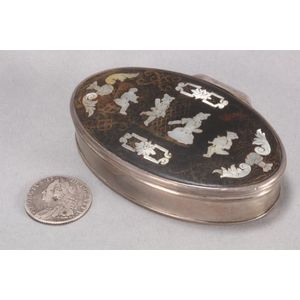Georgian Silver and Tortoiseshell Musical Box: Provenance Fredric Sinfield
Georgian silver, tortoiseshell and Mother of pearl box and cover, of oval form, decorated with figures dancing with musical instruments, on tortoiseshell ground with lattice work, length 7.5 cm. Provenance: collection of the late Fredric Sinfield, Sydney NSW, 1938 - 2008
You must be a subscriber, and be logged in to view price and dealer details.
Subscribe Now to view actual auction price for this item
When you subscribe, you have the option of setting the currency in which to display prices to $Au, $US, $NZ or Stg.
This item has been sold, and the description, image and price are for reference purposes only.
- Georgian - As an English stylistic period, Georgian is usually taken to cover the period from George I (1714) to the Regency of Prince George (1811-20), although the period from 1800 to 1830 is sometimes designated as the Regency period. During the Georgian period the great English cabinetmakers and designers such as Chippendale, Hepplewhite, Adam Sheraton etc., were all active.
Therefore there isn't a single 'Georgian style' as such and to say something is 'Georgian', usually means it was made between 1714 and 1830. This assumes we discount George V and George VI, both being from the 20th century.
The styles popular at the time of each reign were:
George I (1714-1727) saw out the last years of the Baroque period.
George II (1727-1760) reigned during the Rococo period.
George III (1760-1820) saw the last gasp of the Rococo, all of the early Neo-Classic 'Adam style' and most of the later neo-Classic 'Regency style'.
George IV (Prince Regent 1820-1830)encompassed the last of the 'Regency' style.
William IV's reign (1830-1837) was something of a no man's land (stylistically) and he wasn't a 'George' anyway. He covered the last glimmerings of 'Regency' and the start of the 'Victorian' style. - Tortoiseshell - Tortoiseshell is a translucent material that comes from the horny carapace of a certain types of turtles, including the hawksbill turtle. It is often therefore mounted on a colour underground - often red - or inlaid with gold or silver thread, as seen in Boulle furniture.
The texture and colour nuances of the material are extremely important. Heated tortoiseshell can easily be formed into various shapes. Like other natural materials, tortoiseshell becomes more beautiful with use. In a time before plastic, tortoiseshell was widely used for small objects such as combs and powder compacts.
In 1973, the trade of tortoiseshell worldwide was banned under CITES (The Convention on International Trade in Endangered Species). Prior to importing or exporting items containing tortoiseshell a CITES permit must be obtained. Tortoiseshell items cannot be traded on Ebay.
"Faux tortoiseshell", another case of man initiating nature, is made from old-style plastics such as celluloid and cellulos and is coloured with red, yellow and brown spots to imitate the genuine article. It is commonly used in glasses frames, musical instruments and costume jewellery. - Mother-Of-Pearl - Mother-of-pearl, technical name "nacre", is the inner layer of a sea shell. The iridescent colours and strength of this material were widely used in the nineteenth century as an inlay in jewellery, furniture, (especially papier mache furniture) and musical instruments.
In the early 1900s it was used to make pearl buttons. Mother-of-pearl is a soft material that is easily cut or engraved.
Nowadays it is a by-product of the oyster, freshwater pearl mussel and abalone industries.
This item has been included into following indexes:
